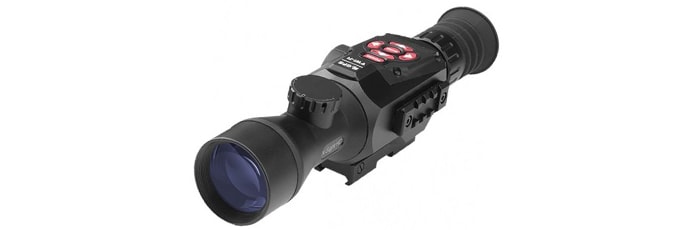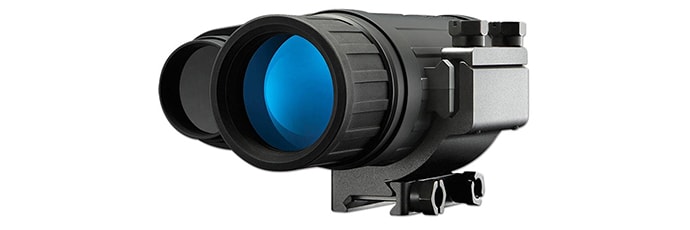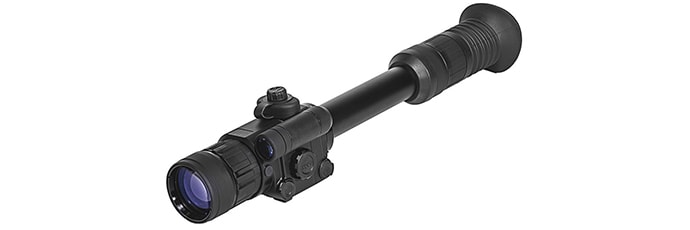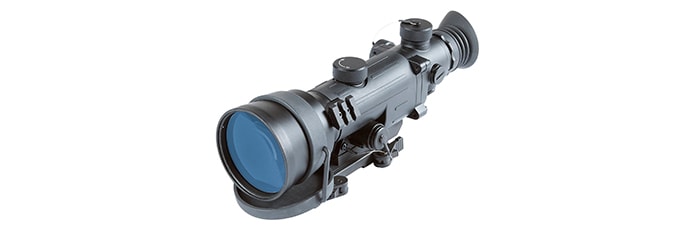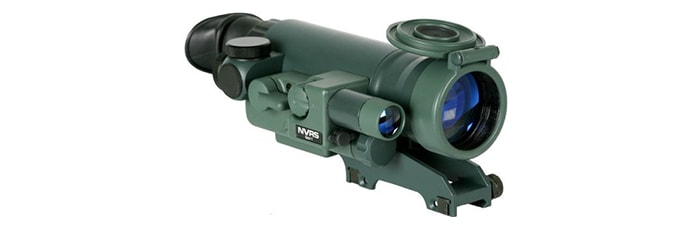5 Best Night Vision Rifle Scopes

One of the biggest obstacles in hunting has always been low visibility. When night falls, you can’t exactly see what you’re shooting.
Night vision scopes get over that difficulty by providing hunters with the ability to see in the dark. Buying the best night vision rifle scope possible should be the aim of any hunter who plans to hunt at night.
There are several advantages to buying a night visions scope. The most notable one is that it allows for hunting after dark.
Before we go further though, we should note that hunting at night is not legal in all jurisidictions. Make sure you’re allowed to hunt at night, before buying a night vision scope!
With a night vision scope, the image won’t be as clear as day time sights, it should be enough for you to be able to point and shoot at your target.
Another useful use for night vision scopes is for enhanced safety. Hunting at night is essentially shooting in the dark.
If you’ve got hunting companions, then you don’t want to hit them. You may also want to find them if they get lost.
Night vision scopes can help with that. Finally, there are some animals that only go out at night. This is mostly because they feel they are safer from most predators then.
To get the most out of these opportunities, you’re going to have to pick up the best night vision rifle scope for yourself. That’s not an easy task though.
With hundreds of possible products to choose from, it can be hard to narrow down which one you should be buying. This article is here to help with that. We’ll be pointing out some important factors to consider later to purchase and a look at some of the best on the market.
Quick Navigation5 Best Night Vision Rifle Scope ReviewsATN X-Sight II 3-14 Smart RiflescopeBushnell NightVision 4.5×40 Equinox ZSightmark Photon XT 4.6x42SArmasight Vampire 3XYukon NVRS Titanium 1.5×42The Ultimate Buying Guide for The Best Night Vision ScopesConclusion
5 Best Night Vision Rifle Scope Reviews
Now that you know what factors that you need to consider, you’re going to have to think about the potential choices you have on the marker. It is still difficult to narrow things down though. To help a bit, here are some reviews of the Best Night Vision Rifle Scopes out there.
Evaluate each item carefully and you should be able to decide on one that will best fit your needs. Remember also that different guns may need different scopes. For example, a long range rifle will need something with powerful magnification.
Here are five reviews of some of the best available scopes right now.
ATN X-Sight II 3-14 Smart Riflescope |
|---|
Score: 4.5 Andrew Garfield
The ATN X-Sight is an impressive example of what you can do with digital technology for a scope. This scope can be used both as a day and a night scope. As a day scope, it functions great.
However, it really shines when you start using its night vision technology. Thanks to the digital night vision tech, you can use this scope constantly. When night falls, just shift to another mode to start seeing things as clearly as daylight.
The scope has a power Obsidian II Core that processes everything easily. The magnification alone should impress at 3x to 14x. Combine this with a 240 foot field of view at 1000 yards, and you’ve got a winner.
This doesn’t even touch on the features like being able to take videos and photos with it. Relive each shot or take wonderful views with the scope alone, then transmit it via WiFi. It is an excellent piece of kit.
Pros
- check
- check
Cons
- exclamation-triangle
Bushnell NightVision 4.5×40 Equinox Z |
|---|
Score: 4.2 Andrew Garfield
The Equinox Z from Bushnell is a scope that provides a lot of value. With an excellent field of view of 28 feet at 1000 yards and a 4.5x magnification, it should be powerful enough to be able to see most anything you point it at, whether its inside a cave or out in the open.
It has several features that make it a must-buy for many people. This includes video and image capture, adjustable IR brightness, and even an include IR illuminator for those moonless nights. This provides night viewing up to 750 feet.
There’s no need to be worried about the batteries either. Load it up with four AA batteries and it should be ready to go. Use rechargeables or store-bought stock and you’ll be ready to go.
The tube itself feels very solid and durable. It should be able to handle a certain amount of rugged stress that hunting scopes go through. Take note though that this scope is not water-proof, just water resistant so better take care of it in the rain.
Pros
- check
- check
Cons
- exclamation-triangle
[tcb-script async=”” src=”//z-na.amazon-adsystem.com/widgets/onejs?MarketPlace=US&adInstanceId=3d96ddbb-6ced-4c0d-a8ef-ba47baaab23c”][/tcb-script]
Sightmark Photon XT 4.6x42S |
|---|
Score: 4.5 Andrew Garfield
The Photon XT from Sightmark is a definite shift away from the big and power end of the spectrum. While 30% lighter than other digital rifle scopes, it also happens to have a longer battery life and provides higher magnification than some of the competition.
At 4.6 magnification it should be able to see a lot father. There is a bit of a sacrifice in the more narrow field of view. However, that is balanced out by the presence of the other features included in the scope. A feature I really love is the wide variety of reticle options.
There are two reticles for crossbow use, two Duplex reticles, and even a Mil-Dot and German-style reticle. This allows the scope to be very flexible on what you can attach to. It also helps that you can change the reticle colors so that it can be flexible.
Image capture is also a big feature. Taking photos of your shots is a good way to remember them.
Pros
- check
- check
Cons
- exclamation-triangle
Armasight Vampire 3X |
|---|
Score: 4.1 Andrew Garfield
Using Armasight’s proprietary CORE image tube technology, this can easily rival any Gen 2 or Gen 3 night vision scope on the market today. This has an incredibly 60 to 70 LP/MM, which is pretty good considering the price. The 3x magnification may be low but it is good enough for most night hunting purposes.
The main problem with this scope is its weight. The entire body of the scope is solid aluminum and has been fully sealed and protected from danger. This has made it a bit rugged, but it places its weight at around three pounds making it a rough sell for those who prefer light guns.
Despite that, any buyer will be pleased with its features like a long-range IR illuminator and a quick release mount. Overall, I am very happy with it and I think many others will be happy with the clarity of image they can get with it.
Pros
- check
- check
Cons
- exclamation-triangle
Yukon NVRS Titanium 1.5×42 |
|---|
Score: 4.5 Andrew Garfield
The Yukon NVRS is a what I’d use if I were hunting small animals and for pest control. This is actually a pretty frequent occurrence. Night is where raccoons, squirrels, and possums come out and mess around in your backyard and garden.
To get rid of them, you’ll want a solid night scope that also happens to be lightweight and durable.
The 1.5 magnification is enough for shooting in range of your home and the 20 degree field of view is pretty good. The 32-36 LP/MM allows you to see everything that is happening. Combine this with a powerful IR illuminator and you should be able to see any movement within 100 yards clearly.
Besides shooting, it also has a wealth of features like its digital camera accessory, laser pointer, and more. All of this is fueled by a fairly power-efficient system, with the AA batteries of your choice slotted in to its power section. You can expect it to run 50 hours with only two batteries being used.
Pros
- check
- check
Cons
- exclamation-triangle
The Ultimate Buying Guide for The Best Night Vision Scopes
When looking for the night vision scope that best fits your needs, you are going to have to go through a list of criteria. You’ll want a combination of traits that best fits your needs. There are actually quite a few of them. Depending on your requirements, they will have differing levels of importance.
For example, if your rifle is not made for long-distance shooting, low-level magnification is all that you need for a scope. With that in mind, you should look through all these factors and consider which ones are the most important to you and focus on those when you’re shopping around a night vision scope.
Magnification
When you’re buying a scope, the assumption is that you’ll be shooting from a distance. The magnification factor of the scope often determines how far away you can shoot. The main problem is that the more powerful the magnification is the bigger the scope has to be. This usually means that it gets to be very expensive.
The usual range for decent magnification for a night vision scope is around 3x to 5x. That will give most people enough magnification while still being affordable. Take note though that some scopes actually do not have magnification. They just provide you with night vision and they are often the most affordable choice.
Field of View
The next most important factor to consider is the field of view. This measures how large of a view you can see through the scope. This is very important if you want to see your targets. Most fields of view are measured at 100 yards.
So if the scope says it has a 25 feet field of view, it means that it will show you around 25 feet when you look in at the scope. This field of view will usually drop down every time you increase magnification. The wider your field of view, the easier it will be for you to find your target.
Weight and Size
Night vision scopes are supposed to be attached to your rifle. The problem with this is that night vision scopes are often a lot heavier than their daytime versions. This is thanks to the extra equipment that it needs to operate. The result is a larger and bulkier body than your ordinary scope.
A heavier scope can mess up your normal aim. A lot of marksmen agree that a perfect shot requires several factors to align and one of these is the weight of your gun. You’ll want a scope that won’t make your rifle too heavy and does not make it clumsy to use.
Clarity and LP/MM
Another important factor when buying a night vision scope is that you need to see what you’re shooting. This is where the LP/MM rating comes in. Better known as lines per millimeter, this rating indicates the level of resolution that the scope has. Low-end night vision scopes can go as low as 5 LP/MM. The more expensive ones can be very detailed at 60 LP/MM.
You don’t need super high-resolution always. For general shooting, you’ll want something in between to balance clarity and your budget.
Additionally, other factors can affect your image clarity like the quality of the lens and more.
Signal to Noise Ratio
When you look into a night vision scope, even the clearest ones, you’ll notice that there’s always a bit of static in the image. That is what its called noise data, a result of the image enhancement by the night vision equipment.
Your goal is to have a lot more signal than noise. This is because the more noise there is in your image, there will be a lot more of that static. This is often caused by how well the equipment cleans up the light signals. The better your night vision scope is, the less static there will be.
Detection and Recognition Range
The next important factor to consider is the range it has. Unlike normal scopes that are limited by light, you will have to depend on equipment to determine how well you can see things. Detection and recognition range looks at how far your scope can see and detect objects. It also has a recognition range for the distance when the object becomes recognizable.
The final tally of this comes from a combination of the lens size, magnification, and how well your night vision equipment functions. You’ll want a good range that would usually be in your usual shooting zone. 100 yards would be a good starting point.
Luminance Gain
Luminance gain is an integral part of the night vision experience. A night vision scope gathers up as much light available to make things visible. The more powerful your scope’s luminance gain is, the further you would be able to see. However, it also increases the price of the scope.
When you’re looking at luminance gain, there are two numbers you’ll have to check. There is the system gain and the tube gain. System gain refers to the light input and light output divided. Tube gain is related to your lenses and if it’s too low or too high can ruin the night vision display.
Batteries
Night vision is not natural and to do what it does, it needs power. This is why you’re going to need batteries for it. Depending on the scope’s power consumption, you’ll have different battery requirements and this can get pretty expensive. You’ll want to know how many batteries are needed because this affect the weight of your scope.
Another reason for knowing the battery type is knowing how you can resupply it. If it needs a special battery, you’ll want to have a stock of those ready so that you have replacements handy. Some scopes actually have rechargeable batteries so take note of those.
Generations
When it comes to buying night vision scopes, the final factor you have to consider is the generation they have. The first night vision scopes are actually pretty old and were first released in the 40s. However, the modern night vision scopes only hit the market in the 50s.
As technology developed, night vision scopes experienced a growth in development. However, older scope technology was retained and is still produced. This is why there are generation ratings for each scope and this reflects how far away they are from the original scope technology and how much they have refined it.
Note that this generation system divides scopes by features. A generation 1 scope will most likely have radically different features than the next generation. There main similarity is that they do not use digital components – which are another line of development entirely.
Additionally, only US manufacturers use this system, so if you’re buying from abroad, better take a close look at the features they offer.
- The very first modern night vision scopes saw sporadic use in the Korean War and really became popular in the Vietnam War. Generation 1 scopes primarily use ambient light to generate their display. This usually means star light and moon light. If those are absent, some scopes have IR light projectors. A good modern example is the Firefield FF16001 NVRS. This has built-in IR to ensure that it will always be active and has a decent 3x magnification. With a solid and lightweight titanium body, rifle owners will appreciate having this attached to their hunting gun on most nights | CHECK IT NOW
- Generation 2 night vision scopes are the next step when it comes to night vision. They are clearer and have a longer range. This is because it uses an image-intensifier tube with a micro-channel tube and a photocathode. The result is that you will be able to see well even without a moon or weak starlight unlike Generation 1. A great example of it is the ATN Gen 2+ Night Arrow. Gen 2+ scopes have added features from the next generation, combining the older with the new. The Night Arrow delivers with its automatic brightness control and one-knob operation | CHECK IT NOW
- Generation 3 of night vision scopes is what the US military currently uses. Generation 3 uses the same image intensification tube that Generation 2 use. However, the big difference is that the photocathode is now covered with gallium arsenide and the MCP is coated with an ion barrier. The result is a longer tube life and a clearer picture. The Night Optics Gladius 760 is one Generation 3 scope that you should try out. It has a 6x magnification and has been proven by years on the field. The rugged design can be taken anywhere and will always be dependable. | CHECK IT NOW
- The latest in technology is what ends up in Generation 4. This generation tends to be the most expensive and cutting edge of technologies. One of the improvements is the removal of the Gen 3 ion film barrier and the addition of optics gating. The result is an image that is over 20 percent clearer. It also has less noise in the image. Other noticeable differences are the reduced need for ambient light and higher gains. It does mean that the tube life is severely degrade and it increases the price tag. However, it can be worth it to get a clear night picture.
Conclusion
After reading the whole guideline to choose a best night vision rifle scope it’s not so hard for the shooters. In this guideline, readers get the proper way to find a night vision scope beside that we recommended a best list of scopes. We believe, readers will get an accurate knowledge and top recommended scopes reviews that suites their requirements.
YOU MAY ALSO CHECK

